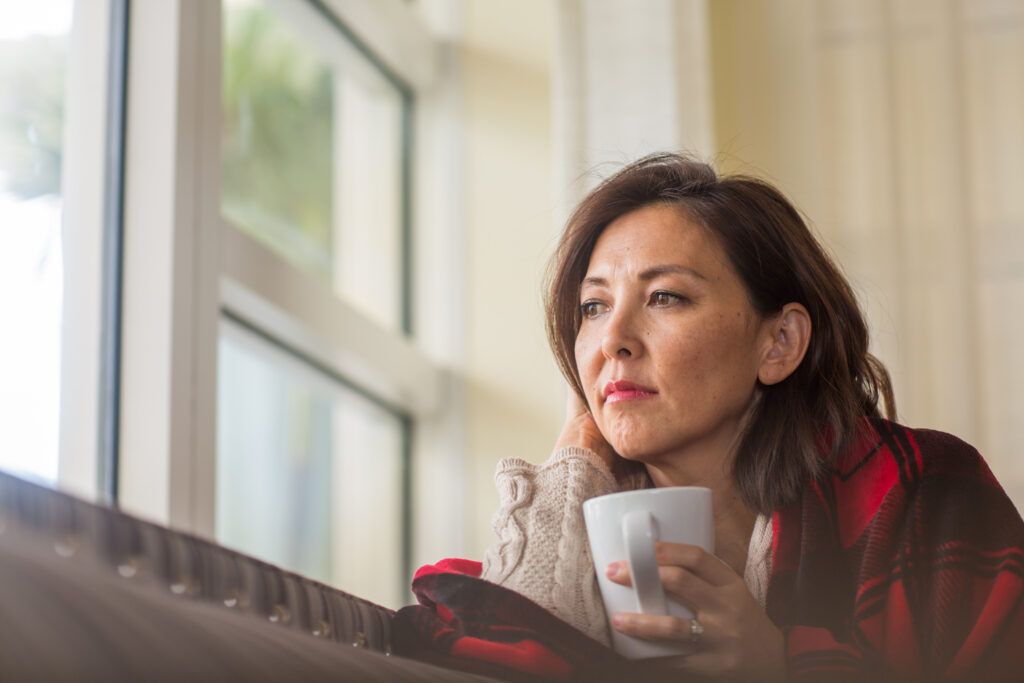The holidays are often thought of as the “most wonderful time of the year” but that’s not always true for those suffering from feelings of depression, loneliness, and anxiety. In fact, the phenomena known as the “post-holiday blues” might be more keenly felt this year, thanks to a global pandemic disrupting our beloved traditions and well-made plans.
The sense of loss we’ve all felt because of Covid-19 has, according to Dr. Bethany Teachman, a professor and the director of clinical training in the department of psychology at the University of Virginia, left us more than a bit drained.
“People are heading into these holidays very depleted,” she tells Guideposts.org. “Far too many people have lost loved ones or jobs, or are experiencing serious economic stress, so there is considerable grief for millions of people this season. Even for those who have been more fortunate during this time, it has been an extended period of stress and uncertainty, and we are often not together with our families and loved ones, so we are tired, strained and things don’t feel quite right.”
To lessen those feelings and still enjoy this time of year, it’s important to focus on the things we can control. That’s why Guideposts.org chatted with Dr. Teachman to identify seven things you can do to beat the “post-holiday blues” and meet the new year with a more positive outlook.
1. Set Realistic Expectations
One reason we frequently experience “holiday blues” is that we often place unrealistic expectations on the holidays, Dr. Teachman tells Guideposts.org.
“It is presented in the media and Hallmark cards as this magical perfect time, but that places a lot of pressure on people to try to create that experience,” she said. “In reality, families don’t always communicate perfectly, people are under financial and a million other kinds of stress, especially right now, and those challenges don’t simply disappear because it is the holidays.”
Instead of over-romanticizing this season—something that’s especially easy to do in the middle of a pandemic—she suggests focusing on one or two things you absolutely enjoy about the holidays and dedicating your energy to that.
“We’ll likely enjoy the holidays more if we have realistic expectations – for many, this means an expectation that some parts will feel relaxing and fun, and other parts will be exhausting and frustrating, just as occurs in our regular lives,’ Dr. Teachman explains. “I often think about trying to increase the proportion of the day that is spent feeling positive and productive, rather than thinking I can make a whole day feel great.”
2. Check In With Yourself
One of the most important things you can do if post-holiday blues are hitting hard is to evaluate your feelings. This means sitting with yourself and taking stock of the emotions that might be influencing your life. If they’ve been around for longer than just a few days, there might be a bigger issue that needs facing.
“Anyone can feel sadness or despair during the holidays, and research shows it is a difficult time for many people,” Dr. Teachman says. “For it to be clinical depression, a person would have to feel sad or irritable most of the day nearly every day for at least two weeks. Whether it is technically a depression or not, sustained experiences of sadness and lack of pleasure in activities you used to enjoy are a signal that you want to make some changes and possibly get help.”
3. Find New Ways To Connect
Because of the pandemic, many of us won’t be physically gathering for the holidays this year. That’s a tough pill to swallow, and it can have an effect on our mental health. Dr. Teachman recommends finding new ways to connect with others, and with yourself, this holiday season.
“It is always important to care for our mental health, just as we care for our physical health,” she explains. “This means finding a good balance of activities that allow us to relax, do pleasurable things, be productive and meet (some of) our goals, and keep our body well-fed, rested, and active. It also means seeking social support in safe, physically distant ways. We are social beings and it is important that we do not add to the feelings of isolation at this time.”
This might mean virtual gatherings – think opening mailed presents on Zoom with your loved ones – or more outdoor activities, like sitting around a camp fire with those in your approved bubble, will be part of the memories you make this year, and that’s okay. Allow yourself to feel sad, lonely, and disappointed in these temporary circumstances, and then face the holidays with hope and a renewed sense of gratitude.
“Those feelings should not be ignored – they are important signals about our needs,” Dr. Teachman allows. “We need to be physically distant, not socially distant. Whether it be through virtual zoom or phone calls with family, or going for a masked, distant walk outside with a friend, it is essential that we stay connected.”
4. Focus On The Small Moments
This year might be especially hard for those who have lost someone, whether to COVID-19 or other causes. It might be equally difficult for people with relatives who are sick or currently infected. These feelings of fear, anxiety, and grief demand to be felt, so don’t try to immediately snuff them out. Instead, Dr. Teachman advises that you focus on small moments of happiness and the things you can control when it comes to celebrating the holidays this year.
“One of the big challenges of this time is to make space so that grief and gratitude and generosity and (occasional moments of) joy can all coexist,” she says. “For those who are actively grieving right now, these holidays will not feel the same as they usually do and that’s okay. It is not reasonable to expect to feel the way we usually do when grappling with heart-breaking losses. Instead, think about how to make some moments better – what can you do to make the next couple hours a little easier? For me, working to build memories with others makes a big difference, so cuddle up with the people in your household, make a nice meal together, and remember that it won’t always feel this hard.”
5. Avoid Enablers
Whether you’re one of the millions struggling with addiction issues, or whether the current pandemic and the added stress of the holidays has tested your sobriety, Dr. Teachman says the best thing to do if you find yourself turning to drugs or alcohol more to get through this time of year is to clear your life of those temptations.
“I encourage people to draw on their available resources, whether that be attending a virtual AA meeting or reaching out to people who are supporting them or checking in with your therapist, and take intentional steps to reduce opportunities to use,” she says. “If you need to reduce your drinking or abstain, don’t have the alcohol in your home. If there’s a particular friend you often get high with, don’t invite them over. Try to actively reduce the times you’ll need to fight those temptations so that resisting (inevitable) urges and cravings will be easier to do.”
6. Practice Gratitude
It might seem like an odd exercise – to practice gratitude during a year when so much has been lost, but Dr. Teachman says it can also give us a healthier perspective and a more hopeful outlook. Yes, these times are difficult, but finding things to be thankful for in spite of that helps us meet the more challenging aspects of this season with renewed optimism.
“We need to both recognize and honor what has been lost as well as appreciate and cherish what we have,” she explains. “I have been making a point of writing extra thank you emails or cards and encouraging my children to do the same. More generally, taking a moment to reflect on what we have, and more importantly, the connections we have with the people in our lives, is important to our health. This can also help us think proactively about how we can help others who are going through a difficult time right now. Notably, when we reach out and help others, not only do they benefit but it also helps our own mental health.”
7. Seek Help
There’s absolutely no shame in seeking help if feelings of anxiety and depression are overwhelming you during the holidays and after they’re gone. In fact, it’s vital that you’re in touch with those feelings so that you can monitor them and notice if they begin to affect your day-to-day life.
“We encourage people to consider whether the sadness, anxiety, anger, etc. are pervasive (so they are affecting you in lots of situations, not only when you read the news, for example), whether they are persistent (so it’s not just a bad day, but the distress is intense and lasting for weeks), and whether they are impairing (so the emotional difficulties are making it hard for you to function and meet your goals – e.g., missing work, finding it hard to engage with your children, just wanting to curl up in bed for extended periods),” Dr. Teachman explains.
If any of these apply, it might be time to reach out. There are plenty of resources available that Dr. Teachman recommends including the telehealth therapist programs on ABCT.org and ADAA.org, the COVID Coach app designed to support your mental health during the pandemic, and the National Suicide Prevention Lifeline. Dr. Teachman’s own lab at the University of Virginia also offers free online interventions through a program called MindTrails. Whichever resource you choose, just remember, you’re not alone.





